A Way of Being Free Read online
Page 4
5
This cannot be said often enough: it is readers who make the book. A book unread is a story unlived. Writers have monumental responsibilities in the execution of their art, but readers also have great responsibilities. They have to make something valuable from their reading. Books are a dialogue between souls. All the untapped energies in great novels should not lie coiled in the pages in vain. All the agony and effort that goes into initiating this dialogue between souls should not be in vain. The reader should bring the best in themselves to meet the best in the writer’s work. There could be a greater potential for good in our lives the more one spirit of freedom dances with another. The energies or the serenity within books is meant, finally, to multiply the energies within the reader, or to deepen their serenity. The true destination of books is life, and the living.
The first joy, therefore, is the joy of service. Stories enrich the world. Stories can change lives. They have changed mine. All writers, at some point, have to make this choice, ask this question: what is the purpose of my art? Most, I suspect, if they are inclined to respond at all, might say something like this: ‘I have chosen to serve my fellow human beings, to soothe, if I can; to create beauty, if I am lucky; to hint at certain fundamental truths, if I am fortunate; and one way or another to give the best of myself to the world, to people I may never meet, and to do so with the incomplete feeling that it is possibly only on the page, in stories, that we can be so tender to one another, so true, so free, so humane, so brave, and so pure.’
It should be clear by now that it is you, great readers of the world, who are at the root of the storyteller’s complex joy.
6
Storytelling is always, quietly, subversive. It is a double-headed axe. You think it faces only one way, but it also faces you. You think it cuts only in one direction, but it also cuts you. You think it applies to others only, when it applies mainly to you. When you think it is harmless, that is when it springs its hidden truths, its uncomfortable truths, on you. It startles your complacency. And when you no longer listen, it lies silently in your brain, waiting. Stories are very patient things. They drift about quietly in your soul. They never shout their most dangerous warnings. They sometimes lend amplification to the promptings of conscience, but their effect is more pervasive. They infect your dreams. They infect your perceptions. They are always successful in their occupation of your spirit. And stories always have mischief in their blood. Stories, as can be seen from my choice of associate images, are living things; and their real life begins when they start to live in you. Then they never stop living, or growing, or mutating, or feeding the groundswell of imagination, sensibility, and character. Stories are subversive because they always come from the other side, and we can never inhabit all sides at once. If we are here, story speaks for there; and vice versa. Their democracy is frightening; their ultimate non-allegiance is sobering. They are the freest inventions of our deepest selves, and they always take wings and soar beyond the place where we can keep them fixed. Stories are subversive because they always remind us of our fallibility. Happy in their serene and constantly-changing place, they regard us always with a subtle smile. There are ways in which stories create themselves, bring themselves into being, for their own inscrutable reasons, one of which is to laugh at humanity’s attempt to hide from its own clay. The time will come when we realise that stories choose us to bring them into being for the profound needs of humankind. We do not choose them. Stories may well be some hidden divinity’s dialogue with the human soul. The divinity may well be the god of all our hidden and unacknowledged truths. The subversion in storytelling is an important part of the transformation of human beings into higher possibilities.
7
But then, to switch metaphors, storytelling is a house of many mansions, a river with many streams. One thinks of Homer’s paradigm of a man who spends twenty years trying to get back home, and who would rather get back to his wife and be mortal than be immortal and dwell with Calypso; or of Ovid, with stories as perpetual metamorphosis, transforming terror into magic; or of Boccaccio, where stories are a way of making the unbearable bearable; or of Scheherezade, with stories as an infinite deferral of death; or of Cervantes, whose Don Quixote preferred to live stories than to read them; or of Aesop, whose stories the people would rather listen to than tolerate the rhetoric of politicians; or the African enchanters, whose stories are rivers reclaiming their own land, and where stories are journeys into the forgotten dreams of the centuries.
8
We all live our lives on this side of the mirror. But when joy touches us, and when bliss flashes inside us briefly, we have a stronger intuition. The best life, and the life we would really want to live, is on the other side of the mirror – the side that faces out to the great light and which hints at an unsuspected paradise.
The greatest stories speak to us with our voice, but they speak to us from the other side.
9
In a fractured age, when cynicism is god, here is a possible heresy: we live by stories, we also live in them. One way or another we are living the stories planted in us early or along the way, or we are also living the stories we planted – knowingly or unknowingly – in ourselves. We live stories that either give our lives meaning or negate it with meaninglessness. If we change the stories we live by, quite possibly we change our lives.
10
Let us extend the heresy. Let’s create a little fugue out of it. Our lives are great invisible novels. It makes no difference that they are unwritten or being written.
It has been said that history (and even the universe) is a vast novel, a divine epic, written by God, whose script we cannot decipher.
On a lower level, it has been hinted that we are writing the novels of our lives as we live, and in the living. Sometimes, by dint of foresight, or in a moment of heaven-sent clarity, we manage the great feat of rewriting the novel that our life is becoming, we manage to improve the first draft, we manage to follow an unpromising first chapter with a brilliant second. And sometimes we manage the even greater feat of transforming the unhappy novel of our lives into a happier one – by understanding the bizarre fact that to some extent we are the novelists and composers of our lives. Like the novel, life is an art as well as a craft. While we may not be masters of all the sources of the material and the sublime waters of inspiration, at least we cannot deny the fact that we wield the pen.
11
How many of us try to live with a sense of beauty about the shape of our lives, the same aesthetic sense that novelists and storytellers bring to the shape of their art? And yet there is a hidden message here – the awareness, shared by not a few historical figures, of the links and causes and consequences of our actions, the mathematics of fate; and the sense – ultimately – of living a unique and fascinating destiny.
12
Even when it is tragic, storytelling is always beautiful. It tells us that all fates can be ours. It wraps up our lives with the magic which we only see long afterwards. Storytelling reconnects us to the great sea of human destiny, human suffering, and human transcendence.
13
Storytellers ought not to be too tame. They ought to be wild creatures who function adequately in society. They are best in disguise. If they lose all their wildness, they cannot give us the truest joys.
14
There are two essential joys in storytelling. The joy of the telling, which is to say of the artistic discovery. And the joy of the listening, which is to say of the imaginative identification. Both joys are magical and important. The first involves exploration and suffering and love. The second involves silence and openness and thought. The first is the joy of giving. The second is the joy of receiving. My prayer is to be able to write stories that, to paraphrase T. S. Eliot, can be read so deeply that they are not read at all, but you become the story, while the story lasts. With the greatest writers, you continue to become more of the story long after you have finished it. Of the two joys, the first teaches us
humility, while the second deepens our humanity.
The Human Race is Not Yet Free
For Salman Rushdie
1
The worst realities of our age are manufactured realities. It is therefore our task, as creative participants in the universe, to redream our world. The fact of possessing imagination means that everything can be redreamed. Each reality can have its alternative possibilities. Human beings are blessed with the necessity of transformation.
2
Writers are the dream mechanisms of the human race. Narrative affects us the ways dreams affect us. They share the same insubstantiality. They both have the hidden capacity to alter reality. Dreams may be freer because they are not composed of words, but when narrative fiction has entered us, it no longer exists as words either.
3
We can control our novels and narratives to some extent, but we cannot control the effect they might have on the world.
And we cannot wholly control our dreams. Sometimes, at night, we dream blasphemous and scandalous things. We dream murders and transformations. We sometimes even dream ourselves into our deepest truths and our unlikely destinies.
4
There is no single way of interpreting dreams that is acceptable to all human beings. Writers create one book which becomes a hundred different books in the minds of those that read it. To some this one book is an object of light, a revelation, an act of liberation. To others, the same book is a monster.
5
Sometimes we dream strange things that make us wonder if there isn’t a subversive inner self – an irrepressible and mischievous spirit within – which delights in showing us just how false are the shapes, boundaries and rules by which we lead our lives. This subversive smiling inner self seems intent on showing us that we cannot get away with restricting the freedom and the mysterious nature of human beings.
6
It may be that sometimes our dreams trouble and offend us so much that we want to restrain the impish freedom of this faculty. It may be that this faculty is telling us something that is too truthful for us to take. But this impish faculty of dreaming becomes more insurrective the more we refuse to listen to it.
The things we refuse to face in life feed the enormous appetite of this dangerous truth-telling inner faculty of dreams. The things we refuse to face in life become monsters in our sleep.
7
If the things we face are greater and more important than the things we refuse to face, then at least we have begun the re-evaluation of our world. At least we have started to learn to see and live again.
But if we refuse to face any of our awkward and deepest truths, then sooner or later, we are going to have to become deaf and blind. And then, eventually, we are going to have to silence our dreams, and the dreams of others. In other words, we die. We die in life.
8
When we die in life, it’s much easier to watch others dying too; it’s much easier to murder the dreams of others, to poison the stream of their lives, to poison their innocence, their love. When we are dead in life we don’t notice when little miracles die around us before our deadened gaze.
9
There are many ways to die, and not all of them have to do with extinction. A lot of them have to do with living. Living many lies. Living without asking questions. Living in the cave of your own prejudices. Living the life imposed on you, the dreams and codes of your ancestors.
10
The reality of what we are doing to one another is explosive. The secret content of our lives is terrifying. There is much to scream about. There are great pullulating lies and monsters running around in the seabed of our century. The river within us has become more frozen than ever before. We need much more than Kafka’s proverbial axe to crack the ice and make the frozen blood of humanity flow again.
Something is needed to wake us from the frightening depths of our moral sleep.
11
The word ‘orthodoxy’ conjures up for me a world in which people have reached the final station of how they define themselves.
12
In the silent world, in the shadow world, there are always people dreaming of changing the configuration.
13
There are no longer any stable frontiers between the imagination and the world.
14
The facts of the world are sometimes more imaginative than the productions of our imagination.
15
If reality is also a battle of contending dreams, then our enchantments, our silence, and our highest love should do the fighting.
16
We live inside the dreams of others. We might be imprisoned in them.
17
Exile is a fleeing from one dream to another one. In the process we change, we metamorphose, and our new shapes are never settled.
18
Living is a continual metamorphosis. Everything is change; everything is relative.
19
When we live with overwhelming orthodoxies, the eruptions within are greater. Then our dreams burst the banks of the acceptable.
20
The greater the visible order, the greater the hidden disorder.
21
There can be no absolutes: no absolute good or evil; no absolute way of living. No absolute truth. All truths are mediated and tempered by the fact of living. Being alive qualifies all things.
22
That is perhaps why the ancient Greeks, the Egyptians, the Africans and the Indians have so many gods. Each god is the abstraction of our different attributes and our different selves which need to be acknowledged and nurtured in harmony with the whole. We have to accept our many selves, and our one self. We need to be unified. All our different selves must breathe and be healthy – the side of us that dreams, the part of us that lives beneath the stream of forgetfulness, the body’s need for celebration and ecstasy, the soul’s need for work, the divine in us that quietly longs for higher union, the erotic in us that craves mortality’s immortal joy.
But when any orthodoxy comes along and tries to repress any of these needs or aspects then rebellious dreams are sooner or later going to break out and disturb the good sleep of the land.
23
What hope is there for individual reality or authenticity when the forces of violence and orthodoxy, the earthly powers of guns and bombs and manipulated public opinion make it impossible for us to be authentic and fulfilled human beings?
The only hope is in the creation of alternative values, alternative realities. The only hope is in daring to redream one’s place in the world – a beautiful act of imagination, and a sustained act of self-becoming. Which is to say that in some way or another we breach and confound the accepted frontiers of things.
24
The other way is to undertake an integral migration, to become an exile within the interiors of the self. We accept, we change in some way, we go mad. We live two lives, become two people. We dislocate. We implode. Then our secret selves become more real than our external selves.
25
Metamorphosis is the essential condition of a state of affairs. It is the true hidden reality that becomes apparent. The essence of things or people is truer than their visible forms. In a metamorphosis the essential truth overruns the external illusion of truth: as you are, so you become. If you are insensitive to the world you turn into a rhinoceros. But there is more to it than that. The basis of metamorphosis is a simple one. It is anguish, or ecstasy.
26
In a world like ours, where death is increasingly drained of meaning, individual authenticity lies in what we can find that is worth living for. And the only thing worth living for is love. Love for one another. Love for ourselves. Love of our work. Love of our destiny, whatever it may be. Love for our difficulties. Love of life. The love that could free us from the mysterious cycles of suffering. The love that releases us from our self-imprisonment, from our bitterness, our greed, our madness-engendering competitiveness. The love that can mak
e us breathe again. Love of a great and beautiful cause, a wonderful vision. A great love for another, or for the future. The love that reconciles us to ourselves, to our simple joys, and to our undiscovered repletion. A creative love. A love touched with the sublime.
27
It isn’t Kafka’s axes we need. We also need the fires of love to thaw the frozen streams within. We need to look at one another afresh, with new eyes. We need to keep doing that. Every day.
We need to tear down the barriers wisely, or else we won’t be able to get out and nothing will be able to come in.
28
These are strange times. Many things stifle our dreams. We may be getting smaller. We should beware of turning into rhinoceri.
29
We should speak out, cry out, but not too much or we won’t be heard for the monotony of our cry.
We should be silent, and serene, and we should plan, but we mustn’t be too silent; or we won’t be heard at all.
30
Before we can create a new world we must first unearth and destroy the myths and realities, the lies and propaganda which have been used to oppress, enslave, incinerate, gas, torture and starve the human beings of this planet.
Facing the lies of history is a basic human responsibility. It is unpleasant to do, but liberating to accomplish. It liberates all of us.
31
All the great religions began as dreams.
32
Religion was the child of suffering and compassion. Suffering is the farthest condition from divinity, but see how all the great religions embrace it. In their purest state, before they busied themselves with the legislation of our lives, and enforced these legislations with earthly powers alien to the immanent source, the great religions brought the infinite compassion of the divine closer to humanity.

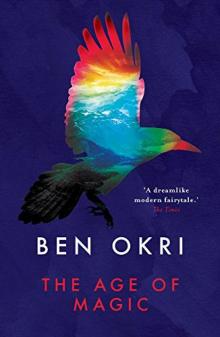 The Age of Magic
The Age of Magic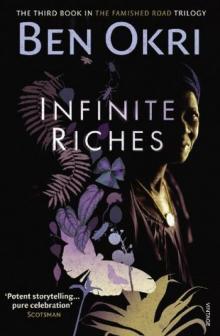 Infinite Riches
Infinite Riches Songs of Enchantment
Songs of Enchantment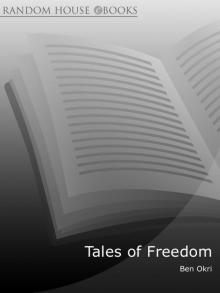 Tales of Freedom
Tales of Freedom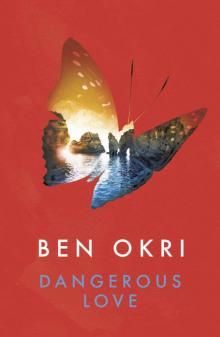 Dangerous Love
Dangerous Love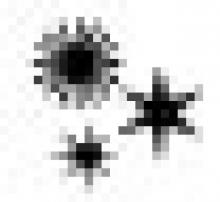 Starbook
Starbook The Famished Road
The Famished Road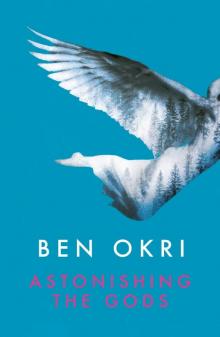 Astonishing the Gods
Astonishing the Gods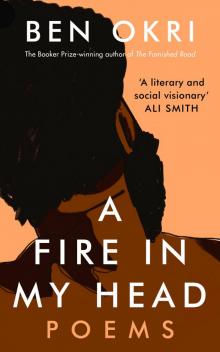 A Fire in My Head
A Fire in My Head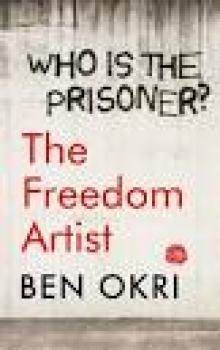 The Freedom Artist
The Freedom Artist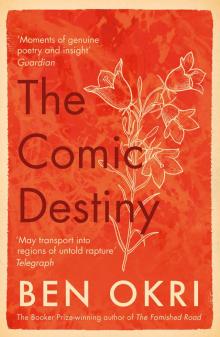 The Comic Destiny
The Comic Destiny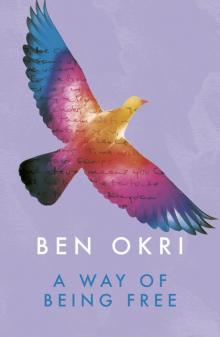 A Way of Being Free
A Way of Being Free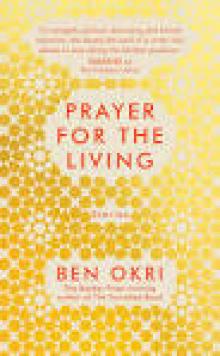 Prayer for the Living
Prayer for the Living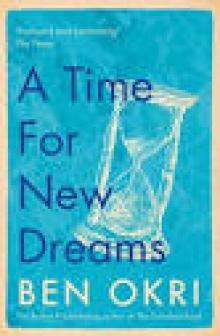 A Time for New Dreams
A Time for New Dreams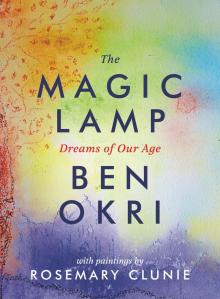 The Magic Lamp
The Magic Lamp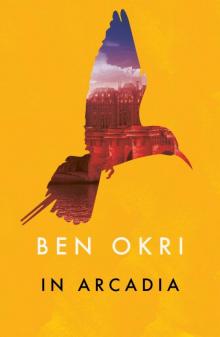 In Arcadia
In Arcadia